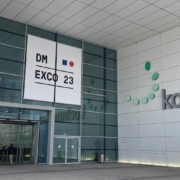- Why the “Internet of Things” should be part of the marketing plan - 20. February 2018
- Jobs for first and fast movers or: Why it’s worth working in a digital agency - 8. February 2018
- Smartphone on wheels - 15. September 2017
- 2016/2017: From the winds of change to the storm of transformation - 19. December 2016
- Facebook Messenger chatbots: a communication channel for brands? - 14. November 2016
- The Opportunities of Digitisation - 10. October 2016
- Successfully understand and use virtual reality - 25. May 2016
For six months, chatbots have existed in Facebook Messenger and there are now more than 30,000 available for users. The initial hype has calmed down and now companies are wondering if bots actually have the potential to become relevant communication and distribution channels for their content.
All chatbots essentially work in the same way. Users ask the bot a question and the bot searches through its stored database in accordance with certain rules, in order to respond with a suitable answer. The greater the database, the greater the knowledge which the chatbot can revert back to.
Mobile driven user behaviour and technical developments smooth the way
The requirements needed for the success of chatbots certainly exist: On one hand, internet usage is extending increasingly to mobile devices and here communication occurs primarily through instant messengers. The approach to text messaging has finally become seen as an everyday matter and the users have got accustomed to this reduced communication form.
On the other hand, all major tech companies are investing massively in the development of artificial intelligence, machine learning and in the understanding and processing of natural language through algorithms. Bot providers can relatively easily incorporate offers and services of interested companies into chatbots via standardised interfaces.
Unpredictable human communication
It will remain some time before a conversation with a chatbot is indistinguishable from a talk with a real person, as many chatbots currently reach the limits of their communication rather quickly. Either they fail in the correct processing of human communication, including all unpredictable factors such as slang, dialect or typos, or their repertoire of responses is rapidly used up. Initial reactions of early adopters were sobering. Among other factors, this was due to the fact that Facebook opened the chatbot platform for developers only a few weeks before the official launch.
Facebooks vice president of messaging products, Davis Marcus, admitted that this time frame was possibly too short to develop a good chatbot. Since the launch, Facebook has made many APIs and much guidance available to developers. We can therefore look forward to seeing how the second generation of bots will turn out.
For long term success, however, two central requirements must be fulfilled, above all:
Discovery: There is currently no easy way to find chatbots for Facebook Messenger, as we are still waiting for the launch of the announced bot store. The user must therefore know the name of the bot and integrate it via the search function of Messenger. Other messengers like Kik, Telegram or Skype already offer overview catalogues.
Added value: So that users don’t delete a chatbot after trying it out just once, from the first use on, the bot must offer real added value. This can include various aspects:
- Reducing complexity and information: shopping bots, such as Tommy Hilfiger’s chatbot, help users when looking for suitable products, by giving them a pre-selection of products through targeted questions. The added value of news bots like the one of CNN also depends upon a reduction in information. Users indicate which content they are interested in and then receive suitable contributions in return through push messages.
- Time efficiency and problem solving: The airline KLM emphasises special service for their customers: if you want to change your seating place, for example, you don’t need to open the app. You can simply send a quick message to the KLM bot.
- Additional offers: In several US cities, through the Absolut Vodka chatbot, users can find bars in which the product is available. The added value here is that the user receives a voucher for a free drink as well.
If these points are further optimised in the new generation of chatbots and the problem of discovering bots is resolved, there is much to suggest that these services will establish themselves as communication channels for brands. With a sufficient amount of offers, in Europe and in North America Facebook Messeger could become a mobile central service point for users, just as weChat, LINE and Kik have done in many Asian markets.
This page is available in DE




